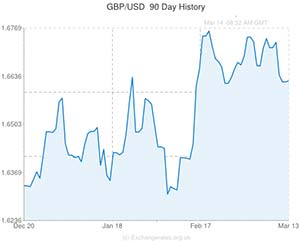
The Pound to US Dollar exchange rate (GBP/USD) gave back the majority of its intraday gains yesterday evening as the Russian/Ukrainian conflict continued to weigh over risk sentiment.
A Russian military exercise close to the border with Ukraine was the catalyst for further political condemnation yesterday. In response, German Chancellor Angela Merkel issued a stark warning to Russian President Vladimir Putin that there would be catastrophic consequences for Russia if he continues to question the sovereignty of the Ukrainian region of Crimea:
“We would not only see it, also as neighbours of Russia, as a threat. And it would not only change the European Union’s relationship with Russia, this would also cause massive damage to Russia economically and politically”.
The Ukrainian crisis has caused investors to drag the Russian stock market down to a 4.5-year low, it has driven Russian government debt up to its highest level in nearly two years and it has caused Goldman Sachs to downgrade its 2014 GDP forecast from 3.0% to 1.0%.
As an important player in the financial marketplace, Russia has the potential to create shockwaves across the global economy. Around 40% of Germany’s and 14% of Europe’s oil is imported from Russia. If trade sanctions were to be imposed then it would likely leave the Eurozone with a supermassive black hole: a vast gulf between supply and demand of oil.
Fears that further political and military escalation could wreak havoc in the European Union, which, en masse, is the world’s largest economic force, have caused some investors to tone down their exposure to risk. Accordingly, the US Dollar, the world’s premier reserve currency, has benefitted from defensive inflows in recent weeks.
Yesterday evening’s developments took the Sterling to US Dollar exchange rate (GBP/USD) down to 1.6635, having previously rallied above 1.6700.
A speech from Federal Reserve policymaker Stanley Fischer added further weight to the argument that the US Central Bank will opt to slowdown its monthly asset purchasing scheme next week:
“I think the exit is beginning, or has begun. The extent of the purchases of the Fed, the monthly amount that is being purchased, is being reduced, and conditions for the continuation of that have been described”.
With US Retail Sales rebounding from a -0.6% contraction in January to post a stronger-than-expected 0.3% expansion in February, and Initial Jobless Claims declining -15,000 to a 3-month low of 315,000 yesterday, it looks as if the “conditions for the continuation” of tapering have been met.

Comments are closed.